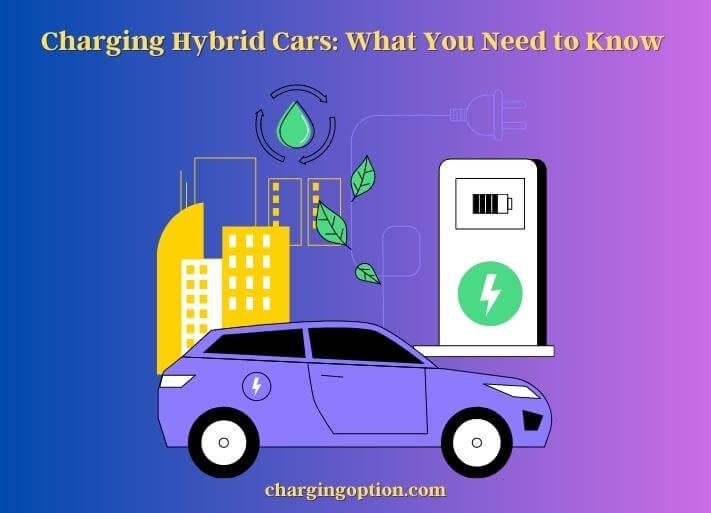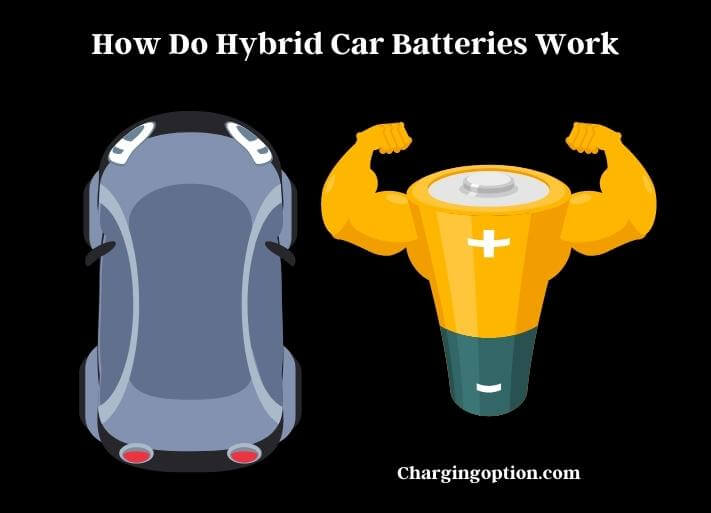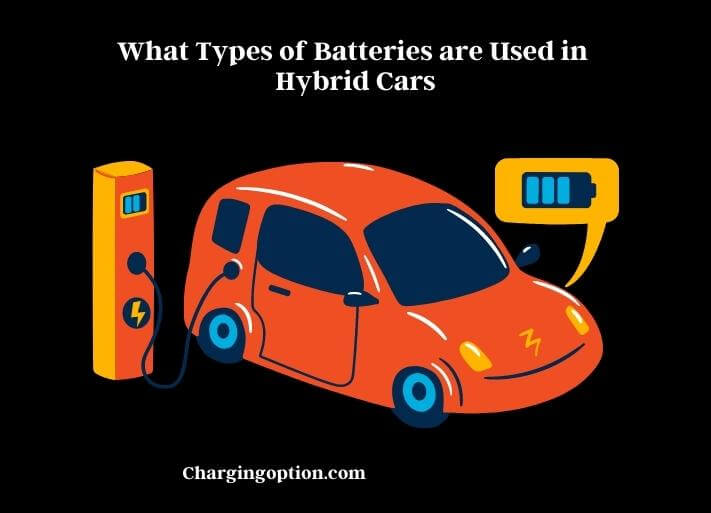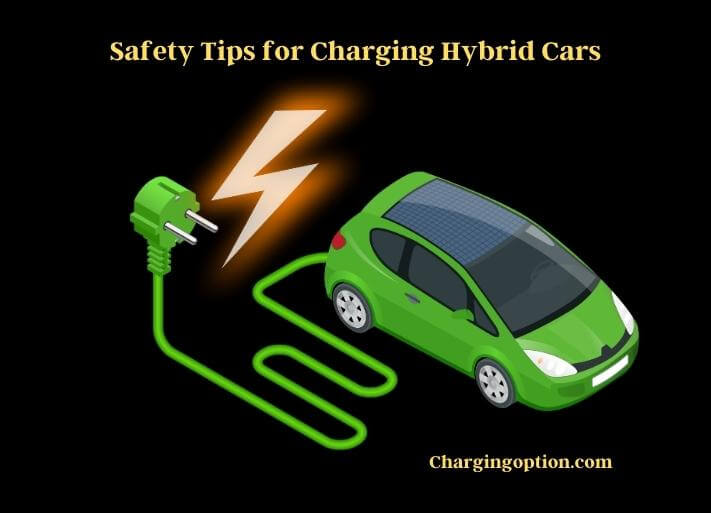Hybrid cars have emerged as a popular and practical alternative to traditional gasoline-powered vehicles, thanks to their fuel efficiency and eco-friendliness. As hybrid cars become increasingly common on the roads, it’s important for owners to understand the basics of charging their vehicles’ batteries.
While there are similarities between charging hybrid and fully electric vehicles, there are also some key differences that are important to keep in mind.

We’ll take a deep dive into charging hybrid cars, exploring the various charging options available to owners, the benefits and limitations of different types of batteries, and some essential safety tips for charging at home or in public.
Whether you’re a seasoned hybrid car owner or just starting to explore the world of green vehicles, this article will provide you with everything you need to know about charging hybrid cars.
How Do Hybrid Car Batteries Work?
Hybrid car batteries work by using a combination of electric power and gasoline to operate the vehicle. The battery is used to power the electric motor, which in turn propels the car forward.
When the driver applies the brakes, the battery is charged through a process called regenerative braking. Regenerative braking uses the electric motor as a generator to convert the car’s kinetic energy into electricity, which is then stored in the battery for later use. This helps to extend the battery’s range and reduce the amount of energy lost during braking.

In regenerative braking, the battery can also be charged by the gas engine. When the car is running on gasoline, the engine charges the battery to ensure that there is enough power available for the electric motor.
Hybrid car batteries typically use a nickel-metal hydride or lithium-ion chemistry, which are known for their durability and reliability. While these batteries can be expensive to replace, they can last for many years with proper care and maintenance.
Pros and Cons of Hybrid Car Batteries
| Pros | Cons |
| Improved fuel efficiency | Higher initial cost compared to traditional gasoline vehicles |
| Reduced emissions | Limited electric-only range |
| Regenerative braking extends battery life | Battery replacement can be expensive |
| Hybrid cars have a longer lifespan compared to traditional vehicles | Battery performance may decrease over time |
| Smaller battery size compared to fully electric vehicles, reducing weight and increasing efficiency | Limited charging infrastructure compared to gasoline refueling stations |
It’s worth noting that the benefits and drawbacks of hybrid car batteries can vary depending on the specific make and model of the vehicle, as well as driving habits and conditions. Hybrid car batteries are a viable and increasingly popular option for drivers looking to reduce their carbon footprint and save money on fuel costs.
What Types of Batteries are Used in Hybrid Cars?
There are two main types of batteries used in hybrid cars: nickel-metal hydride (NiMH) and lithium-ion (Li-ion) batteries.
NiMH batteries are the older and more traditional type of battery used in hybrid cars. They are known for their durability and resistance to overheating, which makes them a reliable option for powering hybrid cars. NiMH batteries also have a lower risk of catching fire or exploding compared to other battery chemistries.
They are heavier and bulkier than Li-ion batteries, which can impact the overall efficiency of the vehicle.

Li-ion batteries, on the other hand, are a newer and more advanced type of battery used in hybrid cars. They are lighter and more compact than NiMH batteries, which improves the overall efficiency of the vehicle. Li-ion batteries also have a higher energy density, which allows them to store more energy in a smaller package.
They are more expensive to produce than NiMH batteries, and they can be more prone to overheating and catching fire if not properly maintained.
Some newer hybrid cars are also beginning to use solid-state batteries, which offer even higher energy density and improved safety compared to traditional battery chemistries. However, solid-state batteries are still in the development phase and are not yet widely available in commercial vehicles.
Charging Hybrid Cars: Options and Considerations
Charging hybrid cars is an important aspect of owning one. Hybrid cars use a combination of gasoline and electric power to operate, and their batteries need to be charged regularly to maintain their efficiency and performance. In this article, we will discuss the different options and considerations when it comes to charging hybrid cars.
Types of Hybrid Car Charging
There are two main types of charging for hybrid cars: Level 1 and Level 2 charging.
Level 1 Charging
Level 1 charging is the simplest and most basic type of charging. It involves using a standard 120-volt electrical outlet to charge the car’s battery. This type of charging is typically slow, taking around 8-14 hours to fully charge the battery, depending on the vehicle’s battery size and capacity.
Level 2 Charging
Level 2 charging is a faster and more efficient type of charging. It requires a 240-volt charging station, which can be installed in a home or public charging station. Level 2 charging can charge the battery in as little as 2-4 hours, making it a much more convenient option for drivers who need to charge their cars quickly.
Considerations for Charging Hybrid Cars
When it comes to charging hybrid cars, there are a few important considerations to keep in mind.
Home Charging vs Public Charging
One of the first considerations is whether to charge the car at home or at a public charging station. Home charging is convenient and cost-effective, as it allows the driver to charge their car overnight while they sleep. Public charging, on the other hand, is useful for drivers who need to charge their car on the go, such as during long road trips.
Charging Cost
Another consideration is the cost of charging the car. Some public charging stations offer free charging, while others charge a fee based on the amount of electricity used. It’s important to factor in these costs when considering the overall cost of owning and operating a hybrid car.
Battery Life and Performance
The battery life and performance of a hybrid car can be impacted by how it is charged. For example, frequent use of fast charging methods can cause the battery to degrade faster, reducing its overall lifespan. It’s important to follow the manufacturer’s recommended charging guidelines to ensure the battery’s longevity and performance.
Safety Tips for Charging Hybrid Cars
While charging hybrid cars is generally safe, it’s important to follow certain safety tips to minimize any potential risks. Some important safety tips to keep in mind when charging hybrid cars are below:

Use a Dedicated Charging Station
It’s important to use a dedicated charging station when charging your hybrid car. These charging stations are specifically designed for electric and hybrid cars and are built to handle the high voltage and current required for charging. Using a regular electrical outlet or an extension cord can be dangerous and increase the risk of electrical shock or fire.
Check the Charging Cable
Before plugging in the charging cable, inspect it for any signs of damage, such as frayed or exposed wires. Using a damaged cable can be dangerous and increase the risk of electrical shock or fire. If you notice any damage, do not use the cable and contact a professional to have it repaired or replaced.
Avoid Charging in Extreme Weather Conditions
Extreme weather conditions, such as extreme heat or cold, can impact the performance and safety of hybrid car batteries. It’s important to avoid charging your hybrid car in extreme weather conditions to prevent any potential damage to the battery or the charging equipment.
Follow the Manufacturer’s Guidelines
It’s important to follow the manufacturer’s guidelines for charging your hybrid car. Each car may have different charging requirements and guidelines, and it’s important to follow these to ensure the safety and longevity of the battery.
Do Not Overcharge the Battery
Overcharging the battery can be dangerous and increase the risk of electrical shock or fire. It’s important to monitor the battery level and disconnect the charging cable once the battery is fully charged.
Keep the Charging Area Clean and Dry
Keeping the charging area clean and dry can help prevent any potential hazards or accidents. It’s important to avoid charging your hybrid car in wet or damp areas and to clean up any spills or debris around the charging station.
Advancements in Hybrid Car Charging
Hybrid car technology has come a long way since the first hybrid car was introduced in the late 1990s. In recent years, advancements in hybrid car charging technology have made charging faster, more convenient, and more efficient.
Wireless Charging
One of the most significant advancements in hybrid car charging technology is wireless charging. This technology allows for the charging of hybrid cars without the need for a physical charging cable. Instead, the car is parked over a charging pad, and the charging process begins automatically. This technology is still in its early stages, but it has the potential to revolutionize the way hybrid cars are charged in the future.
Fast Charging
Fast charging technology has been a game changer in the world of hybrid car charging. This technology allows for faster charging times, with some charging stations capable of fully charging a hybrid car in as little as 30 minutes. This makes hybrid cars more convenient for drivers who need to charge their cars quickly while on the go.
Smart Charging
Smart charging technology allows for more efficient charging of hybrid cars. This technology can monitor the charging process and adjust the charging rate to ensure the battery is charged to the desired level while minimizing the amount of energy used. This can help reduce charging times and save energy costs.
Portable Charging
Portable charging technology allows for hybrid car charging on the go. These portable charging units can be carried in the trunk of the car and plugged into a regular electrical outlet to charge the car’s battery. While portable charging is slower than other charging methods, it can be useful for emergency situations or for charging in areas where charging stations are not available.
Solar-Powered Charging
Solar-powered charging technology uses solar panels to generate electricity to charge hybrid cars. This technology is still in its early stages, but it has the potential to revolutionize the way hybrid cars are charged in the future by providing a renewable and sustainable source of energy.
If you want to know about wall chargers, See here for details.
In a Nutshell
Hybrid cars have become increasingly popular in recent years due to their fuel efficiency and eco-friendliness. Charging hybrid cars is an important consideration for any hybrid car owner, as it ensures the car’s battery stays charged and is ready to go.
With advancements in hybrid car charging technology, charging hybrid cars has become faster, more convenient, and more efficient than ever before. From wireless charging to solar-powered charging, there are many different options available to suit the needs of any hybrid car owner.
It’s important to always prioritize safety when charging hybrid cars, by following the manufacturer’s instructions and taking necessary precautions. As the demand for hybrid cars continues to grow, we can expect to see even more exciting advancements in hybrid car charging technology in the future.
